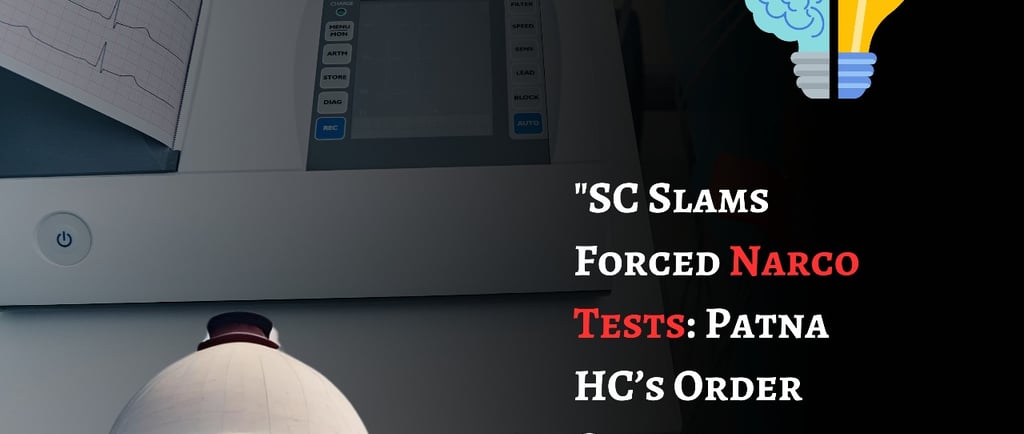"SC Slams Forced Narco Tests: Patna HC’s Order Quashed for Violating Right to Privacy and Liberty"
6/18/20253 min read


In a significant ruling, the Supreme Court of India has set aside a controversial order of the Patna High Court that had allowed the conduct of narco-analysis tests on all accused persons in a dowry and disappearance case. The judgment, delivered by a Bench comprising Justice Sanjay Karol and Justice Prasanna B. Varale, reinforces the fundamental rights enshrined under Articles 20(3) and 21 of the Constitution and reiterates that no individual can be forcibly subjected to narco-analysis tests.
Background of the Case
The matter stems from Criminal Appeal No. __ of 2025 (arising from SLP (Crl.) No. 5392 of 2024) filed by Amlesh Kumar, challenging the Patna High Court's interim order dated November 9, 2023. The High Court, while hearing a regular bail application, had accepted the submission of the Sub-Divisional Police Officer (SDPO), Mahua, proposing narco-analysis tests of all accused, including the appellant.
The case relates to the disappearance of the appellant’s wife, following allegations of dowry harassment. An FIR was lodged on August 24, 2022, under various IPC provisions, including Sections 363 and 498A. According to the complainant, the woman went missing on August 21, 2022, and has not been located since. The appellant claimed that his wife left during a bus journey and did not return.
Despite co-accused family members being granted bail, the appellant's bail request was denied by the Sessions Judge and later came up before the Patna High Court. During this hearing, the investigating officer proposed conducting narco-analysis tests on all accused and some witnesses, which the High Court accepted.
Supreme Court’s Observations
The Supreme Court was unequivocal in its stance. Referring to the landmark judgment in Selvi & Ors. v. State of Karnataka (2010), the Court reiterated that the involuntary administration of narco-analysis tests violates the constitutional right against self-incrimination (Article 20(3)) and the right to personal liberty (Article 21). The Court underscored that these are sacrosanct and non-derogable rights.
A key paragraph from the judgment noted:
“Under no circumstances is an involuntary or forced narco-analysis test permissible under law. Consequently, a report of such involuntary test or information that is discovered subsequently is also not per se admissible as evidence in criminal or other proceedings.”
The Court strongly criticized the High Court’s acceptance of the police’s proposal to conduct the test, stating it contravened established legal principles and Supreme Court precedents.
On Voluntary Narco-Analysis and Admissibility
The Supreme Court also addressed the issue of voluntary narco-analysis tests. It held that even voluntary tests are not directly admissible as evidence, though any fact discovered as a result of such tests may be admissible under Section 27 of the Indian Evidence Act, 1872.
Citing Vinobhai v. State of Kerala (2025) and Manoj Kumar Soni v. State of M.P. (2023), the Bench clarified that:
“A report of a voluntary narco-analysis test, even with safeguards, cannot form the sole basis of conviction. Supporting evidence is necessary to establish guilt beyond reasonable doubt.”
Accused’s Right to Request Narco-Test: Not Absolute
On the question of whether an accused has a right to voluntarily undergo such a test, the Bench noted divergent views among High Courts. While some have permitted voluntary tests under the right to defense, the Supreme Court dismissed this argument, stating that no accused has an indefeasible right to undergo a narco-analysis test.
Instead, the concerned trial court must evaluate the circumstances, consent, and legal safeguards before granting such permission. The Court ruled:
“There is no indefeasible right with the accused to undergo a narco-analysis test. Upon receipt of such an application, the Court must consider the totality of circumstances including free consent and appropriate safeguards.”
The Court reiterated the guidelines issued in Selvi and emphasized the role of judicial scrutiny, especially in recording the accused’s consent before a magistrate and ensuring representation by a lawyer during the procedure.
Critique of High Court’s Approach
The judgment expressed surprise and concern over the High Court’s approach while considering a bail application under Section 439 of the CrPC. The Court cited Sangitaben Shaileshbhai Datana v. State of Gujarat (2019) where a similar overreach had been decried.
It remarked:
“By ordering the above-mentioned tests and venturing into the reports of the same with meticulous details, the High Court has converted the adjudication of a bail matter to that of a mini trial indeed. This assumption of function of a trial court by the High Court is deprecated.”
Final Verdict
The Supreme Court set aside the Patna High Court’s interim order and held that modern investigative techniques, while important, must not infringe on constitutional safeguards. The bail application of the appellant was left to be decided afresh, in accordance with law.
The Court concluded:
“Keeping in view the above discussion, we have no doubt that the impugned Order cannot be sustained… In the attending facts and circumstances of this case, the Appeal is allowed.”
Conclusion
This verdict reaffirms the Supreme Court’s commitment to upholding individual liberties and procedural safeguards in the criminal justice system. By declaring that involuntary narco-analysis cannot be allowed and that even voluntary tests are legally constrained, the Court has set clear boundaries for investigative authorities and lower courts alike.
The decision also serves as a caution against judicial overreach during bail proceedings and reiterates the foundational importance of the rights to privacy, liberty, and fair trial.
